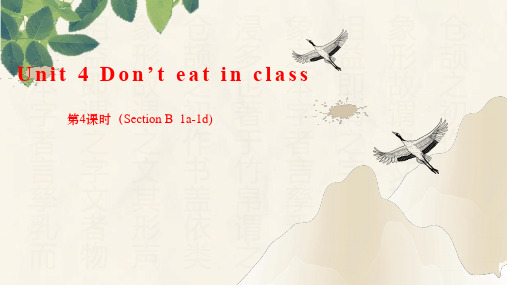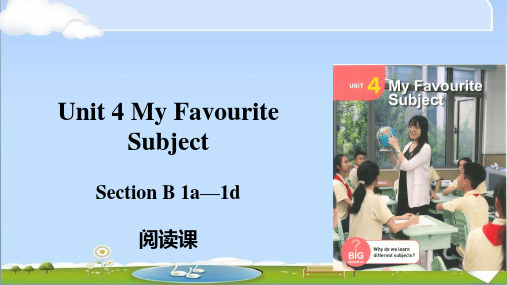unit 4第四课时
四年级上册英语课件-Unit 4 第四课时 陕旅版(共17张PPT)

课后作业
用英语做个一周末的时间表吧!
17
Yes, I do. 2. Yes, I do.
巩固练习
二、按要求写句子。
3. What is your father?(根据个人情况回答)
3. He a farmer.( 答案不唯一 ) He is is a farmer.( 答案不唯一 )
4. Do you have any balls in your box?(翻译成汉语) 你的盒子里有球吗?
巩固练习
二、按要求写句子。
1. We have milk and bread for breakfast.(对画线部分提问)
What's for breakfast? What do you have for breakfast?
2. Do you go to bed at eight?(做肯定回答)
一、选择正确的答案。 ( )1. — do you go to bed? — At ten. A. What B. When C. What's ( )2. She TV in the evening. A. watch B. watching C. watches ( )3. — you go home at four? — Yes, I do. A. Did B. Does C. Do ( )4. I have a teddy bear. A. don't B. not C. isn't ( )5. Dinner ready. A. is B. are C. be
—Yes, we do./ No, we don’t.
(3)—When does your father/mother + 动词短语?
PEP四年级上英语Unit4第4课时Part B Let’s talk优质课教案

The fourth period(第四课时)Part B Let’s talk & Ask, answer and write▶教学内容与目标课时教学内容课时教学目标Let’s talk ·能够理解对话大意;能够用正确的语音、语调朗读对话·能够在情景中运用句型“Where are…?”“—Are they on/ near…?—Yes, they are./ No, they aren’t.”询问物品的位置,同时作出判断·能够在情景中恰当运用功能句“Open the door, please.”提出行动建议Ask, answer andwrite·能够在游戏中进一步巩固和运用“询问复数物品的位置并做出应答”的句型▶1. 能够听懂、会说句型“Where are they?”“—Are they…? —Yes, they are./ No, they aren’t.”。
2. 能够理解并正确朗读课文对话,发音准确、语调自然。
▶教学难点1. 能够在真实的语境中运用本课的句型来询问物品或人物的位置,并进行回答。
2. 能够正确使用单复数形式。
▶教学准备1.预习《状元大课堂》《创优作业100分》《状元作业本》中本课时的相关内容。
2. PPT课件、课文录音、视频等。
▶教学过程Step 1: Warm-up & Revision & Lead-in1. Greetings.2. A guessing game—“Where is my pen?”①T: Look, it’s my pen. Now close your eyes, please.(将钢笔藏在一个地方)Open your eyes, please. Where is my pen now? You can ask me like this: Is it in/ on/ under… the…? Guess, please.S1: Is it in the desk?T:No, it isn’t....3. Let’s chant.Present the chant. Ask students to read together. Teaching purpose①通过游戏和chant来复习A部分的重点句型,帮助学生唤醒他们的已有知识,并为下一环节的学习做好准备。
小学英语PEP版 六年级上册Unit4 第四课时

The fourth period(第四课时)Part B Let’s try & Let’s talk内容分析本课是PEP小学英语六年级第一册Unit 4第四课时。
主要学习并在情景中恰当运用句型“—Does he/she…? —Yes, he/she does./No, he/she doesn’t.”谈论他人信息。
老师将通过多种教学活动巩固重点单词和句型,使学生掌握本节课知识点。
课时目标知识与能力·能够读懂Let’s try板块的题目要求,学会听前预测要听的重点内容·通过完成听力题目能对即将发生的故事进行预测·能运用基本听力技巧完成主旨题和细节题·能够通过观察、谈论Let’s talk板块的图片,在图片和教师的帮助下理解对话大意,并能回答对话下面的问题·能够通过听录音,学会按照正确的意群及语音、语调朗读对话,并能在小组中进行角色表演·能够听、说、读、写并在情景中恰当运用句型“—Does he/she…? —Yes, he/she does./No, he/she doesn’t.”谈论他人信息,并通过对话简单了解澳大利亚的首都堪培拉和著名城市悉尼·能够在语境中借助图片等帮助理解新词“Canberra, amazing”的意思,并能正确发音过程与方法基于对话创设一些有关John的信息,帮助学生更多地了解Wu Yifan的笔友。
以一般疑问句的形式操练本课的核心句型,也为接下来的巩固活动拓展相关表达,做好充分的语言准备。
情感态度价值观指导学生根据教材下方表格完善给John的交友信息,使学生能熟练运用所学语言谈论自己的相关信息以及兴趣爱好。
同时渗透结交朋友要有共同兴趣爱好的情感教育。
教学重难点教学重点1.能够理解和掌握本课时的重点词汇和句型。
2.能够听、说、读、写并在情景中恰当运用句型“—Does he/she…? —Yes,he/she does./No, he/she doesn’t.”谈论他人信息教学难点能够听、说、读、写并在情景中恰当运用句型“—Does he/she…? —Yes, he/she does./No, he/she doesn’t.”谈论他人信息。
Unit4Myfamily第四课时英语教案

作业布置:
1.口语作业:
-学生需要录制一段视频,使用本节课学到的家庭成员词汇和句型介绍自己的家庭成员,并分享一段关于自己家庭的小故事。
-完成一份家庭Biblioteka 员角色扮演的对话,与同学合作,模拟真实的家庭场景进行对话练习。
2.写作作业:
-根据本节课的内容,编写一篇小作文,描述自己的家庭结构和家庭成员的特点。
-鼓励性:在指出问题的同时,应给予学生积极的鼓励和认可,增强学生的学习信心。
-指导性:提供具体的改进建议,帮助学生明确如何改正错误和提高能力。
教学手段:
1.多媒体教学:利用PPT、视频、音频等多媒体工具,丰富教学形式,提高学生的学习兴趣和注意力。
-使用PPT展示重点词汇和句型,配合音频教学,帮助学生正确发音。
-播放与家庭主题相关的英语视频,激发学生的学习兴趣,提高听力理解能力。
2.教学软件应用:运用互动式教学软件,实现个性化学习,满足不同学生的学习需求。
2.课后自主学习和探究:
-研究性学习任务:鼓励学生选择一个感兴趣的家庭类型,通过查阅书籍、网络资料等方式,收集相关信息,并制作成报告或展示,分享给同学。
-创作性写作练习:学生可以尝试编写一个小故事,描述自己的家庭生活或家庭成员的趣事,提高写作能力的同时,加深对家庭情感的理解。
-视听学习资源:推荐学生观看与家庭主题相关的英语动画片或纪录片,如《Peppa Pig》中的家庭生活片段,通过视听学习,增强英语语感和文化认知。
教学实施过程
1.课前自主探索
教师活动:
-发布预习任务:通过学校在线平台,发布关于家庭成员词汇和基本句型的预习资料,明确预习目标和要求。
-设计预习问题:围绕家庭成员的主题,设计问题如“你有多少家庭成员?”“你能用英语描述你的家庭成员吗?”引导学生自主思考。
冀教版七年级英语下册教案Unit 4 第4课时

第四课时Lesson 22Big Plans for the Weekend 课时目标自主学习一、根据句意及首字母或汉语提示写出单词。
1.Hurry up, Sandy.You'll be late for school!2.Would you like to go somewhere with me tonight?3.Actually(真实地), she is talking on the phone with her classmate.4.This is my mum's cooking(烹调)recipe.5.Can you help me with the housework(家务劳动)?I'm so tired.二、写出下列画线短语的汉语意思。
1.Are you in a hurry to go somewhere? 匆忙2.Actually Jenny, I have big plans for the weekend! 有……的计划3....read a book,surf the Internet,watch TV and help my mum with the housework.上网;帮忙做家务教学过程环节1新课导入教师展示图片,启发学生思考;学生根据图片内容进行讨论。
Free talk:What are you going to do this Saturday? Why?设计意图:用学生观察图片和进行自由讨论的形式来引入新课,使课堂氛围更为活跃;同时激发了学生的学习兴趣,锻炼学生的口语表达能力,自然而然地过渡到本课时的学习。
环节2新课学习1.让学生独立阅读Lesson 22 的对话,把握其大意;然后教师请两名学生来概括对话的主题。
2.教师播放录音,学生模仿录音的语音语调,跟读对话并勾画出其中的重要单词、短语以及句子。
3.教师讲解对话的重要知识点,适时请学生起来翻译重难句。
Unit 4 第4课时(Section B 1a-1d) (课件)七年级英语下册(人教版)

1d Talk about the rules in Dave’s house.
He can’t go out on school nights.
He can’t watch TV in the evening.
1d Talk about the rules in Dave’s house.
He can’t see his friends on school days.
does his homework
Look and say
What does he often do?
practices the guitar
Look and say
What does he often do?
does the dishes
Look and say
What does he often do?
பைடு நூலகம்
every Saturday on school days every morning
before dinner after dinner
1c
Listen again. Write when Dave has to follow the rules in the chart in 1b. Choose from the phrases in the box.
Emily : Hi, Dave. Do you _w_a_n_t_t_o_w__a_tc_h__th_e__b_a_sk_e_t_b_a_ll_g_a_m__e_in the park this evening? Dave: I’d love to, but I can’ t go out_o_n_s_c_h_o_o_l_n_i_g_h_ts__. Emily: Oh, that’s too bad. Dave: Yeah, I have s_o__m_a_n_y__ru_l_e_s... Emily: Really? Dave: Yeah, I can’t __se_e__m_y__fr_i_e_n_d_s_o_n_s_c_h_o_o_l_d_a_y_s_and I have to do my homework after school.
Unit4第四课时

Unit4 Period Four学习目标:Self-check (P30)学习重难点:1. sure 的用法 2. forget的用法学习过程:一、掌握单词。
自学指导:1.根据音标读单词,从“ copy”到“danger”,不会读的单词用红笔标出来。
并将这些单词背过。
(6分钟)2.合上课本,做下列词汇题,检查对单词的灵活运用。
(3分钟)1).__________ (copy)other’s homework is a bad habbit.2).He _______ _______(克服) his bad habbit3). He has his o car. He has a car of his o_________.4).My grandpa and grandma live in a small v_______ now.5).My h_________ is a beautiful place. I like it.6).She is out of d___________.7).The man is Mrs Green’s h___________, Mr Green.二、预习P30 Self check内容. 回答下列问题(5分)1. Why did the writer have a fight with Xiao Li?_______________________________________________2. Why did the writer think it wasn’t a good idea to copy other’s homework?________________________________________________3. Do you think Xiao Li would get over copying other’s homework?________________________________________________4. What did Xiao Li say at last?__________________________________________________5. She said it was much better if she did her own work.(翻译句子)_______________________________________________三、认真读课文,弄明白文章大意, 将不明白的句子划出。
新人教版英语七年级上册 Unit 4 第四课时 Section B 1a-1d

Review
按要求写出正确的单词、词组或句子。
1.听 (短语) __li_s_te_n_t_o
2. 擅长(短语) _____b_e_good at
3. 记住(动词) _r_e_m_e_ber
4. 每个人(名词) _____e_v_eryone
5. 和……一样(短语) t_h_e_s_a_m__e_as 6. 特别的 (形容词) ____s_p_ec_i_a_l _
numbers. We learn how to work out
in class在课上
feel like感觉像是
maths problems in class. It feels like magic and is really fun. Maths is very
magic n. 魔法
useful adj. 有用的 a useful lesson 一节有用的课
class schedule课程表
English
maths
Chinese
history
PE
biology
music
geography
Prediction(预测)
Look through the passage and answer these questions.
look through浏览
1. What kind of passage is it?
Sunday is the first day of the week. 第一天
Sunday Sun - day
/ˈsʌn/ /deɪ/
Chinese English math music
一周的 第二天
What day is it ? Monday Mon - day
- 1、下载文档前请自行甄别文档内容的完整性,平台不提供额外的编辑、内容补充、找答案等附加服务。
- 2、"仅部分预览"的文档,不可在线预览部分如存在完整性等问题,可反馈申请退款(可完整预览的文档不适用该条件!)。
- 3、如文档侵犯您的权益,请联系客服反馈,我们会尽快为您处理(人工客服工作时间:9:00-18:30)。
2) too many rules “太多的规定” too many + 可数名词复数 太多 …… too much + 不可数名词 太多 …… much too +adj 太…… He has ____ _____ friends to meet. 他有很多朋友要见。 We have ____ _____ work to do. 我们有许多工作要做。 The coat is ____ _____ big for me. 外套对我来说太大了。
注意: 在there be结构中, 如果主语不止一 个, 谓语动词和与之最接近的主语在 数上保持一致, 即就近原则
____ ____a pen, two pencils and four books on the desk. 桌子上有一支钢笔, 两支铅笔和四本书。 ____ ___ two maps and a picture on the wall. 墙上有两张地图和一幅画。
6. I KNOW HOW YOU FEEL. 我明白你的感受。
2015/12/22
feel v. 感受;觉得 “feel + 形容词” 感到/觉…… Take a deep breath, and you will feel relaxed. 深深地吸一口气, 那样你会觉得轻松的。 The table ____ very smooth(光滑的).
3)DON’T LEAVE THE DIRTY DISHES IN THE
leave: 1)v.留下,落下 例:不要把你的书留在家里。
Don’t leave your books at home.
CHICKEN!
2)v. 离开(某地) 例 leave school/home 常用词组leave for +目的地 “动身去某地” 例 She leaves for shanghai . 她动身去上海。
EITHER
2015/12/22
either
adv. “也”,用于否定句句末, 是否用逗号隔开均可。 例如: My father can’t speak English. My mother can’t (speak it), either. 我爸爸不会讲英语,我妈妈也不会
also,too和either辨析
4). must与have to的区别
2015/12/22
must是“必须”的意思, have to是“不得不”的意 两者都可看作情态动词,后边接动词原形。有时候 两者可以互换。
两者的区别是must一般用于一般现 在时和一般将来时; 而have to可以用于任何时态。
1.he __ study hard. 2.It's cold outside.she ___ ___ put on her coat.
即学即练
2015/12/22
用too,also或either填空。
I don’t like banana. He doesn’t like banana, ______. I'll go to see the film, _______.
They _______ have fish shops in that small town.
例:This film is very ____.这部电影很令人放松。
relaxed:adj.主要用来修饰人,表示某人“感到轻松的”
例:He is _____ after listening to music.听完音乐后,他感到轻松。
拓展:
相同用法的词还有: interesting/interested;boring/bored;exciting/excited
Unit 4
Don’t eat in class.
共四课时
Section B 2a-3c 第四课时
学习目标:
1.掌握2b重点单词和短语。 2.掌握there be 句型的用法并会灵活运用。 3.熟练应用情态动词can,have to和祈使句讨论规章制度。 4.学会与他人讨论规章制度,发表自己的想法。
2015/12/22
too 是普通用词,多用于口语,语气较随便。一般用在肯 定句中,放在句末。 I'm in Row 1, too. 注意:also和too一般都用于肯定句。 either 表示“也”时,一般只用于否定句,且置于句末。 I don't know him. Tom doesn't know him, either. If you don't go there, he won't go there, either.
5). After dinner, I can’t relax either.
晚饭后我也不能放松。
2015/12/22
relax: v. 放松;使放松
例:Playing games always relaxes me. 做游戏总是使我放松。
relaxing:adj.主要用来修饰物,表示“令人放松的”
2015/12/22
3. Molly __________ has to/must read a book after dinner before she ______ can watch TV.
4. At school, Molly _____ can’tbe noisy or eat in class. 5. Parents and schools make rules to help
红 色 字 体 部 分 重 要 短 语 和 句 子
Dear Molly, I know how you feel. People always tell us, “Don’t do this!”or “You can’t do that!” But think about it, Molly. There are a lot of things you can do.You can play basketball on weekends. You can watch TV after you read a book. Parents and schools are sometimes strict, but remember,they make rules to help us,We have to follow them. Good luck! Dr. Know
重点: 2b重点单词和短语; there be 句型
难点:熟练应用情态动词can,have to和祈使句讨论规章制度。
学习任务单1:
结合课本,组内讨论解决,解 决不了的可咨询别的组,仍解决不了的由老师来统一解答
一.朗读2b课文,回答以下问题 。 1.Who writes the letter to Dr.Know? 2.What are the rules in Molly’s family? 3.What is Dr.Know’s opinion(观点)? 二.再次朗读课文,完成2C并核对答案。 三. 在文中找出下列短语和句子,核对答案后两人相互提问。 1.太多规则 2.起床 3. 整理床铺4. 把脏盘子留在厨房5.跑到 学校 6.有更多规则 7.打篮球8.放学后9.做作业10.在周末 11.晚饭后12.读书 13.看电视 14.去睡觉15.考虑16.好运 17.我知道你的感受。18.这有很多你可以做的事情。19.他 们制定规则是来帮助我们。
also是较正式的用语,语气较庄重。它通常放在句中,位于行为 动词之前;系动词,助动词或情态动词之后。 例如: Peter also has two brothers. I am also a student. Mrs. Green can also sing the song in Chinese.
学习任务单2:
2015/12/22
四. 根据课文,思考下列问题:
1.there be 句型表示什么意思及遵循什么原则? 2. 辨析词组too many, too much ,much too 3.动词leave 的用法。 4.must/have to 的异同。 5.辨析①relax,relaxing,relaxed ;② also,too,either的用法。 6.动词feel的用法。 7.There are a lot of things you can do中a lot of things you can do的用法。 8.strict 和remember的用法。
A. look
C. feels
B. turn
D. smell
7. THERE ARE A LOT OF THINGS YOU CAN DO. 这 有许多你可以做的事情。
2015/12/22
此句中a lot of things you can do是一个名词短语,句 子you can do起着修饰,限定名词things的作用,即 后置定语。英语中当句子限定修饰名词时要放在该 名词之后。 e.g. There are a lot of songs you can sing.
2015/12/22
students. So students _____________ have to/ must follow
the rules.
1). There are too many rules! 1) there are: “有” * There be : “有” “人或事物的存在” *There be 后面的名词是句子的主语, 属倒装结构 *There be+名词(人/物)+地点(时间) “某 个地方或某个时间存在某人或某物”, 谓语动词的单复由后面的主语决定。
这有许多歌曲你可以唱。
8 Parents and schools are sometimes strict, but remember,they
